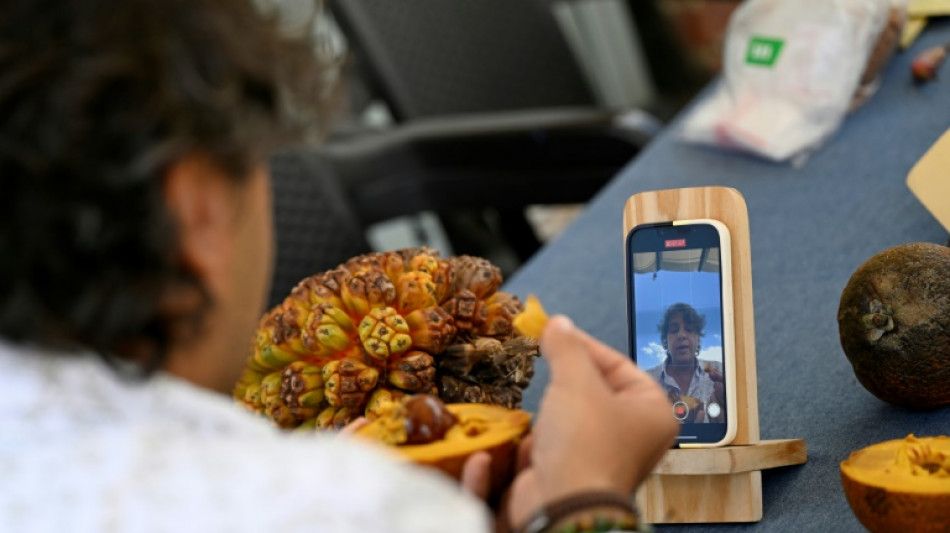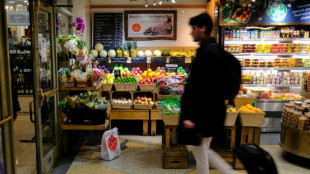
-
 US military assets in the Middle East
US military assets in the Middle East
-
Neymar hints at possible retirement after World Cup

-
 Stocks rise after court ruling against US tariffs
Stocks rise after court ruling against US tariffs
-
Australia end dismal T20 World Cup by thrashing Oman

-
 Olympics chief says Milan-Cortina has set new path for Games
Olympics chief says Milan-Cortina has set new path for Games
-
Russian SVR spy agency took over Wagner 'influence' ops in Africa: report

-
 Pegula fights back to sink Anisimova and reach Dubai final
Pegula fights back to sink Anisimova and reach Dubai final
-
Trump administration denounces 'terrorism' in France after activist's killing

-
 Colombia's Medellin builds mega-prison inspired by El Salvador's CECOT
Colombia's Medellin builds mega-prison inspired by El Salvador's CECOT
-
German broadcaster recalls correspondent over AI-generated images

-
 US Supreme Court strikes down swath of Trump global tariffs
US Supreme Court strikes down swath of Trump global tariffs
-
England's Itoje says managing 'emotional turmoil' key to 100 cap landmark

-
 Trump says weighing strike on Iran as Tehran says draft deal coming soon
Trump says weighing strike on Iran as Tehran says draft deal coming soon
-
Tudor is '100 percent' certain of saving Spurs from relegation

-
 Azam dropped for scoring too slowly, says Pakistan coach Hesson
Azam dropped for scoring too slowly, says Pakistan coach Hesson
-
Stocks volatile after soft US growth data, court ruling against tariffs

-
 Italy bring back Capuozzo for France Six Nations trip
Italy bring back Capuozzo for France Six Nations trip
-
From Malinin's collapse to Liu's triumph: Top Olympic figure skating moments

-
 Arteta urges Arsenal to 'write own destiny' after title wobble
Arteta urges Arsenal to 'write own destiny' after title wobble
-
Ukraine Paralympics team to boycott opening ceremony over Russian flag decision

-
 Wales captain Lake wants fans to bring 'noise' against Scotland
Wales captain Lake wants fans to bring 'noise' against Scotland
-
Skier Vonn's Italian hospital a hotbed of men, sister says

-
 India target S.Africa top order, Abhishek to come good: bowling coach
India target S.Africa top order, Abhishek to come good: bowling coach
-
Carrick praises Man Utd 'diversity' after Ratcliffe's immigrant rant

-
 I never thought it would be hit, says 'Scream' creator 30 years later
I never thought it would be hit, says 'Scream' creator 30 years later
-
AI summit statement delayed to 'maximise' signatories: India

-
 Barcelona's Sagrada Familia basilica hits peak height
Barcelona's Sagrada Familia basilica hits peak height
-
Milan sprints to second straight UAE stage win as Tiberi keeps lead

-
 US GDP growth misses expectations as Trump blames shutdown
US GDP growth misses expectations as Trump blames shutdown
-
Benfica investigate video of fans' monkey gestures

-
 French minister pledges tight security at rally for killed activist
French minister pledges tight security at rally for killed activist
-
Guardiola 'couldn't care less' about Arsenal stumble in title race

-
 UK police search property as royals reel from Andrew's arrest
UK police search property as royals reel from Andrew's arrest
-
Germany's Merz to visit China next week

-
 Kompany says Mourinho made 'huge mistake' in Vinicius racism row
Kompany says Mourinho made 'huge mistake' in Vinicius racism row
-
X appeals EU's 120-mn-euro fine over digital content violations

-
 Galthie recalls hulking locks Flament, Meafou for Italy
Galthie recalls hulking locks Flament, Meafou for Italy
-
Turkey, Saudi sign major solar power deal

-
 US Olympic freeskier Hess embraces 'loser' tag after Trump blast
US Olympic freeskier Hess embraces 'loser' tag after Trump blast
-
European stocks rebound, oil prices ease after US-Iran volatility

-
 'Alpha male' AI world shuts out women: computing prof Hall
'Alpha male' AI world shuts out women: computing prof Hall
-
New Zealand freestyle skier Ives in hard Olympic crash

-
 New Zealand must adapt quickly to Sri Lanka wickets: Chapman
New Zealand must adapt quickly to Sri Lanka wickets: Chapman
-
Thai activist's jail term for royal insult extended to 30 years

-
 Families of Duterte's drug war victims eye Hague hearing with hope
Families of Duterte's drug war victims eye Hague hearing with hope
-
India chases 'DeepSeek moment' with homegrown AI

-
 UN touts panel for 'human control' of AI at global summit
UN touts panel for 'human control' of AI at global summit
-
Ukraine Paralympics team to boycott Opening Ceremony over Russian flag decision: statement

-
 UK monarchy reels from Andrew's stunning arrest
UK monarchy reels from Andrew's stunning arrest
-
Somaliland, where Muslims love Israel


Colombia's 'Lord of the Fruit' fighting for native species
Bent over his cellphone on the terrace of his Bogota apartment, Colombia's "Lord of the Fruit" describes the flavors, textures, and potential uses of rare species to thousands of social media followers.
Gian Paolo Daguer, a 47-year-old environmental engineer, is on a mission to save these natural delicacies from extinction in one of the most biodiverse countries in the world.
In one of the many videos on his Instagram page, Daguer extolls the virtues of the lucuma, a little-known tropical fruit he is introducing to the uninitiated.
The lucuma looks somewhat like a small coconut on the outside, with flesh that resembles yellowish avocado pulp.
"This is considered the queen of Peruvian fruits," says Daguer as he explains the lucuma's genealogy and geographic spread, then cuts it open and takes a bite.
"It is a fruit that is not very juicy... It can be eaten as a fresh fruit, but it is very dry. Nevertheless, it has a strong caramel-like flavor," he describes.
Like the lucuma, several fruit native to Colombia and the region are not widely eaten in a country where internationally popular species such as mango, papaya, watermelon and pineapple are better known.
Some local fruit are now at risk of extinction precisely because of their low profile.
"As our diet becomes more homogenized, we all eat the same thing all over the world, so these (native) species are taking a back seat," Carolina Castellanos, a biologist with the Humboldt Institute, a biodiversity research body in Bogota, told AFP.
"And that means that as we consume them less, they are also grown less... and it is easier for them to disappear," she said.
One endangered fruit in Daguer's collection is the "churumbelo," a berry native to Colombia's Boyaca department, where its natural environment is threatened by farming and mining.
"Its taste is sweet and refreshing, reminiscent of the flavor of a pear," said Daguer of the specimen that took him years to track down.
- Disappearing before they are found -
A 2022 study by the Humboldt Institute and other research bodies determined the country was host to at least 3,000 "edible" plant species.
But one in ten -- possibly more -- are threatened with extinction.
In 2024, Colombia lost a swath of forest roughly the size of Hong Kong to land clearing for farming and coca leaf growing, according to the environment ministry. Coca is the main ingredient in cocaine.
In increasing numbers, residential gardens and balconies countrywide are sporting fruit trees grown from seeds that Daguer sends to interested followers.
They pay only for the postage.
His "frutas_colombianas" (Colombian fruits) channel has more than 108,000 followers, and Daguer also curates a series of WhatsApp chats where biologists, farmers, and chefs share knowledge of rare fruit and arrange seed exchanges.
"This kind of learning is often not documented by science, but with this interest from the public, we all end up learning," Daguer, who since childhood has had a passion for discovering rare fruit, told AFP.
In fact, his work contributed to the first-time cataloging in 2024 of the quinguejo, a dark berry that grows in Nuqui -- a village in the country's remote northwest.
Daguer fears fruit may be disappearing from nature before they are even discovered.
"We definitely can't keep thinking that we can carry on destroying the ecosystems," he said.
Nature will need human help to recover, added the man dubbed "Lord of the Fruit" by his followers.
"And recovery is achieved by replanting."
Chef Antonuela Ariza, one of Daguer's collaborators, tries to do her part by adding rare fruit to the menu of her restaurant Mini-Mal in Bogota, to promote biodiversity.
Specialties include a mayonnaise made with camu-camu -- similar to a grape -- an Amazonian black chilli sauce, and a cocktail of copoazu, which is reminiscent of the cacao fruit.
"What we don't eat is lost," Ariza told AFP.
L.Davis--AMWN


